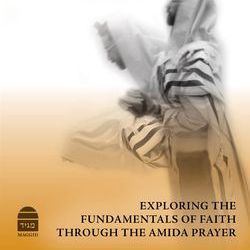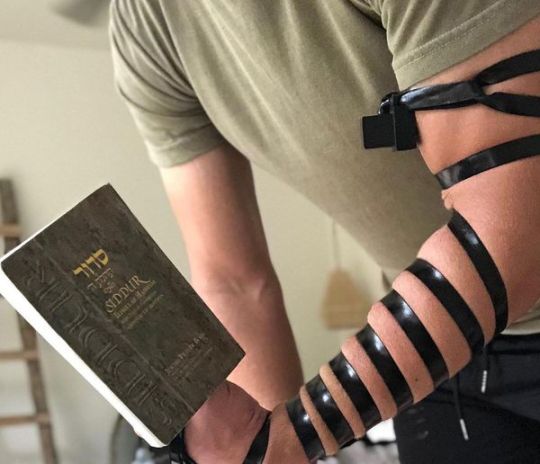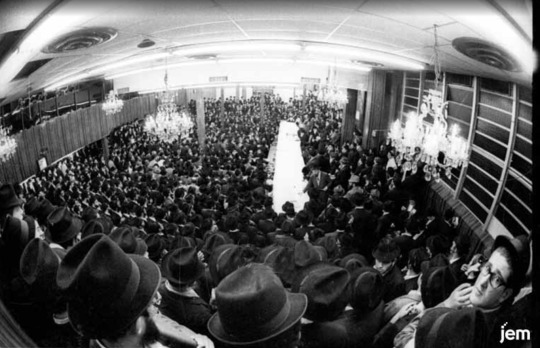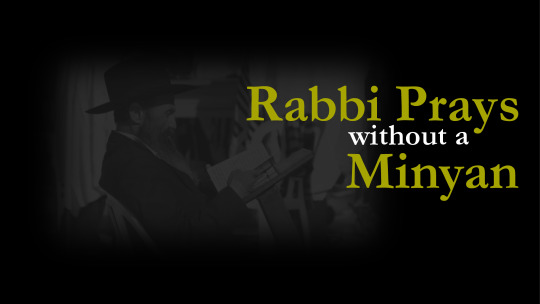#shemoneh esrei
Text

אֲדֹנָי שְׂפָתַי תִּפְתָּח וּפִי יַגִּיד תְּהִלָּתֶֽךָ:
"My Lord, open my lips, and my mouth will declare Your praise."
[From the opening declaration of the Sh'moneh Esrei silent prayer]
Chana was the mother of the famous prophet Shmuel. She struggled with fertility, and was taunted by her husband's other wife for this. She went to pray to Hashem in the Mishkan, and composed a silent, pleading prayer. Eli the High Priest saw her, and at first thought she was drunk because she was praying without moving her lips, which wasn't the norm at the time. However, she wasn't drunk, and asserted this to Eli. He apologized and promised her that her requests would be answered, and within the next year she had a son, who she dedicated to Hashem by committing him to be a Nazir and serve in the Mishkan. He would become a great prophet who would anoint both King Shaul and King David.
It is because of Chana's original silent prayer that every day, at least three times a day, we have a silent prayer in the form of Sh'moneh Esrei.
We begin the Sh'moneh Esrei by asking Hashem for help to let our words flow, and it's something that's really meaningful to me for when I have trouble finding my own words.
[id in alt text]
#jumblr#judaism#tanakh#shmuel#chana#shemoneh esrei#jewish prayer#the amidah#my art#jewish art#jewish women
70 notes
·
View notes
Text
the congregations with a budget have literally nothing on the shuls I've been to where you're 20 people over the fire marshal's limit, it's 90 degrees because it's the summer and everyone's body heat has measurably raised the temperature, you have to take three tiny steps back for shemoneh esrei because you'll slam into the table behind you otherwise, and you can't even breathe wrong or you'll breathe right into the guy next to you's face
2 notes
·
View notes
Text
davening update 2/4
5 days to the mikvah!
i’ve got maariv aravim down as well as v’ahavta, but i’ve gotta practice ashrei more. but i’m up to “the righteous” in shemoneh esrei. i add one blessing of the shemoneh esrei each day at mincha and/or maariv.
each morning i say modah ani, netilat yadayim, asher yatzar, and then go onto yedid nefesh, mah tovu, adon olam, yigdal, elohai, and the birkot hashachar. i don’t really daven shacharit in full yet but i’ll get there. i want to at least get to full speed with the shemoneh esrei in hebrew before i start pesukei d’zimrah.
6 notes
·
View notes
Text
A Nation That Will Dwell in Solitude

In the past two issues, we wrote about the importance of waking up and getting out of bed at midnight. We focused on two tasks and their accompanying benefits: (1) by learning Torah after midnight, we draw down a thread of chesed throughout the day, and (2) by reciting Tikkun Chatzot, we help raise the Shechinah from the dirt, helping to merit in the rebuilding of the Holy Temple and ushering in the final redemption. In this issue, we will add a third important reason why we should wake up and get out of bed while it is still night.
We are all familiar with the story of Balak hiring the prophet Bilaam to curse the Nation of Yisrael. But every time Bilaam opened his mouth, he praised them instead of cursing them, for example (Bemidbar 23:9): כִּי־מֵרֹאשׁ צֻרִים אֶרְאֶנּוּ וּמִגְּבָעוֹת אֲשׁוּרֶנּוּ הֶן־עָם לְבָדָד יִשְׁכֹּן וּבַגּוֹיִם לֹא יִתְחַשָּׁב (For I see it from the top of the rocks, and from the hills I observe it. Behold! It is a nation that will dwell in solitude, and it will not be considered among the [other] nations). What is the meaning of ‘a nation that will dwell in solitude’? And why is this statement one of praise? Although introverts readily appreciate the benefit of being alone, a highly extroverted individual might actually dread it! So how is being alone something praiseworthy for everyone, for the entire nation?
Lamenting why so much suffering and tragedies befall the Jewish People, the Chofetz Chaim writes (Likutei Amarim 10): ולא יסתפק אדם במה שמתפלל השמונה-עשרה שלש פעמים בכל יום, אלא כמה פעמים ביום צריך לשפוך תפילות ובקשות בינו לבין עצמו כשהוא בביתו מעומקא דליבא .כי השלש תפילות הן אצלו כבר שגורות בפיו ואינו נותן לב להם כל כך; מה שאי כן אם יתבונן כל אדם בינו לבין עצמו ויעשה חשבון נפש על מצבו ומעמדו (A person should not be satisfied with the three times he prays the Shemoneh Esrei each day; rather, many times throughout the day he needs to pour out his prayers and requests, privately, by himself, when [for example] he’s in his house, from the depth of his heart, because his mouth is already accustomed to saying the three [formal] prayers, and as a result, he doesn’t pay attention to them all that much. But that’s not the case if everyone were to be introspective and do a cheshbon nefesh [personal examination] on his situation and his standing in life). He continues to explain that we are not answered in our three regular daily prayers because we don’t pour out of heart to Hashem when we pray. Instead, we’re praying like a machine. Plug it in, set the speed dial to ‘rapid’, push the ‘start’ button and away it goes. If we spoke to our friend or spouse that way, do you think they would be particularly interested in listening to what we had to say? Likewise, do you really think Hashem is any different in this regard?
The Chofetz Chaim is speaking about the need for everyone to spend time each day—even throughout the day—praying to Hashem in one’s own words, a practice known as hitbodedut [private, secluded prayer].
R' Nachman taught (Likutei Moharan II:25): הַהִתְבּוֹדְדוּת הוּא מַעֲלָה עֶלְיוֹנָה וּגְדוֹלָה מִן הַכֹּל דְּהַיְנוּ לִקְבֹּעַ לוֹ עַל־כָּל־פָּנִים שָׁעָה אוֹ יוֹתֵר לְהִתְבּוֹדֵד לְבַדּוֹ בְּאֵיזֶה חֶדֶר אוֹ בַּשָּׂדֶה וּלְפָרֵשׁ שִׂיחָתוֹ בֵּינוֹ לְבֵין קוֹנוֹ...שֶׁיְּקָרְבוֹ אֵלָיו לַעֲבוֹדָתוֹ בֶּאֱמֶת (The practice of doing hitbodedut is very exalted and greater than everything, i.e. to fix a time for oneself, at least one hour or more, to seclude oneself alone in some room or in the field, to lay out one’s conversation in private with one’s Creator…that he would be able to draw closer to Him and serve Him in truth). It doesn’t make any difference if we feel that we are already close to Hashem or if we feel that we are too far from Him to be of importance or if we can’t even open up our mouths to say anything, the main point is to spend time in solitude knowing that you’re sitting with Hashem. This in and of itself is very, very good. In fact, there is nothing greater than this.
Regarding the best time and place for hitbodedut, we read in Likutei Eitzot, Hitbodedut 7: עִקַּר הַהִתְבּוֹדְדוּת הוּא בַּלַּיְלָה שֶׁאָז הַכֹּל יְשֵׁנִים וְגַם טוֹב שֶׁיִּהְיֶה הַמָּקוֹם חוּץ מֵהָעִיר שֶׁיֵּלֵךְ בְּדֶרֶךְ יְחִידִי דְּהַיְנוּ בְּמָקוֹם שֶׁאֵין בְּנֵי אָדָם הוֹלְכִים שָׁם אֲפִלּוּ בַּיּוֹם (The essence of hitbodedut is at night because then everyone is asleep, and it is also good that he should be in a place outside the city, that he walk to a solitary place, i.e. a place where even by day people don’t go). The reasons for this are because the quietness of night is the best time for obtaining clarity about oneself because the cares of the world are decreased. Although these parameters are optimal if one is able to fulfill them, they should never prevent someone from spending his hour of hitbodedut during the day in a room of his house if that works for him. The main point is to spend one interrupted hour alone with Hashem, each and every day. Once you get used to this hour, it should become the best hour of your day.
But what is the real purpose of hitbodedut? Is it to tell Hashem all the things we need or want in life, to make our requests known to Him—“I need a good spouse. I need a nice apartment. I need a high paying job. I need…”? No. That’s the purpose (in part) of the Shemoneh Esrei. The purpose of hitbodedut is something completely different. Simply put, it is to work on oneself, to fix one’s deficiencies and faults, to achieve self-nullification, thus becoming part of the necessary reality. Let’s explain.
Two kinds of realities exist: necessary reality and dependent reality. Hashem, of course, is the ultimate and only necessary reality. Everything created in all the worlds is just a dependent reality. None of it must exist. All of it came into existence by the Creator who spoke it into existence, as it is written (Tehillim 33:6, 9): בִּדְבַר יְיָ שָׁמַיִם נַעֲשׂוּ וּבְרוּחַ פִּיו כׇּל־צְבָאָם...כִּי הוּא אָמַר וַיֶּהִי הוּא־צִוָּה וַיַּעֲמֹד (By the word of Hashem heaven was made, and by the breath of His mouth, all of their host…He spoke and it was, He commanded and it stands). The moment Hashem created the soul of Adam ha‑Rishon to have free will to choose and to do His will, reality changed. All of the created worlds acquired a certain aspect of the necessary reality, i.e. all the upper and lower worlds need to exist in order for Hashem’s purpose to be fulfilled. And what is that purpose? It is to return and be encompassed in one’s Source, in the only true, independent necessary reality. This is all explained in detail by R' Nachman in L.M. 52, but here’s a short summary: וְעַל־כֵּן אָז דַּיְקָא כְּשֶׁעוֹשִׂין רְצוֹנוֹ נִכְלָל הָעוֹלָם בִּבְחִינַת מְחֻיַּב הַמְּצִיאוּת כַּנַּ"ל כִּי כָּל מַה שֶּׁעוֹשִׂין רְצוֹנוֹ יוֹתֵר הֵם נִכְלָלִין בְּיוֹתֵר עִם כָּל הָעוֹלָמוֹת הַתְּלוּיִים בָּהֶם בְּחִיּוּב הַמְּצִיאוּת (Therefore, it is specifically then, when we [the inheritors of the mission and soul of Adam ha‑Rishon, i.e. Yisrael] do His will, that the world is included in an aspect of the necessary reality, for the more we do His will, the more we are included together with the worlds which are dependent upon them, in the necessary reality).
This is really an amazing and awesome truth! Even though the world and everything in it, including ourselves ‘start off’ as a dependent reality in that everything is created by Hashem and has no independent existence in and of itself, when the object and purpose of His creation actually perform the will of its Creator, then not only do all the worlds acquire a certain aspect of the necessary reality but, more importantly, the people who perform His will also acquire a certain aspect of the necessary reality. And it is a matter of degree. The more we do Hashem’s will, the more we are encompassed in His Oneness, and the more the world and everything in it, including ourselves, become part of this same necessary reality.
Now the logical question is: How do we actually achieve becoming encompassed in one’s Source so that we move from being a dependent reality to being a part of the necessary reality? R' Nachman explains (L.M. 52): אַךְ לִזְכּוֹת לָזֶה לְהִכָּלֵל בְּשָׁרְשׁוֹ דְּהַיְנוּ לַחֲזֹר וּלְהִכָּלֵל בְּאַחְדוּת הַשֵּׁם יִתְבָּרַךְ שֶׁהוּא מְחֻיַּב הַמְּצִיאוּת זֶה אִי אֶפְשָׁר לִזְכּוֹת כִּי־אִם עַל־יְדֵי בִּטּוּל שֶׁיְּבַטֵּל עַצְמוֹ לְגַמְרֵי עַד שֶׁיִּהְיֶה נִכְלָל בְּאַחְדוּתוֹ יִתְבָּרַךְ (However, to merit this, to be encompassed in one’s Source, i.e. to return and be encompassed in the Oneness of Hashem, may He be blessed, who is the necessary reality, is possible only through bitul [self-nullification]. A person needs to nullify himself completely to the point that he becomes encompassed in His Oneness, may He be blessed).
Self-nullification? That seems a bit drastic, if not kind of weird. What does it really mean? Bitul means to negate all of one’s negative character traits and all of one’s physical desires and lusts—anger, impatience, theft, stinginess, harboring grudges, jealousy, laziness, selfishness, stubbornness, ungratefulness, speaking negatively about others, self-justification, lying, lusting after food and drink, lewdness, feasting one’s eyes on that which is forbidden to look at, immodesty, desire for honor and prestige, love of money, arrogance, lack of emunah and bitachon, etc. But isn’t that impossible? R' Nachman assures us that it is very achievable, not just by the tzaddikim, but by all of us. How so? These are his holy words (L.M. 52): וְאִי אֶפְשָׁר לָבוֹא לִידֵי בִּטּוּל כִּי־אִם עַל־יְדֵי הִתְבּוֹדְדוּת (It is impossible to achieve bitul except through hitbodedut). This is the real reason for hitbodedut. It is the most powerful tool available for fixing ourselves. Reading self-help books, listening to lectures and inspirational talks, reading articles (like this one), or even talking to therapists may be fine and dandy, but that will not get us to the goal of our lives, which is to return to our Source and become encompassed in the Infinite for eternity.
But it seems so overwhelming! Perhaps, but that’s why we were given life in the first place, to achieve that which seems so impossible. After all, is anything truly impossible with G‑d? Can He not help us achieve the impossible if we really want it? But we have to be honest. We can’t go into hitbodedut and pretend. The moment we walk out into that field or close that door, we have to be real. We have to speak only truth. Nothing gets fixed without truth. We start with one negative trait and we keep talking to Hashem about it night after night until we negate it. It may take years of concerted effort, but all sincere effort will be rewarded. And when we nullify one negative trait, we move onto the next one, and so on, until we nullify them all. At that point there will be nothing left of us. We will have achieved complete bitul and become nothing, i.e. no-thing—even as Hashem is ‘No-thing’. This is how we prepare for becoming merged into the Eternal Infinite, to be fully encompassed in the necessary reality even as Hashem is the necessary reality.
May G‑d give us strength to be what we were destined to be, a nation that dwells in solitude (not because of government coercion, but voluntarily), each one of us becoming an expert at hitbodedut and achieving his true mission in life.
2 notes
·
View notes
Text
De Amidah: Een heilig gebed van verbinding en bezinning
De Amidah, ook bekend als de Shemoneh Esrei, is een van de meest centrale en essentiële gebeden in de Joodse liturgie. Dit gebed wordt elke dag meerdere keren gereciteerd door vrome Joden en dient als een diepgaand middel voor verbinding met het Goddelijke en een reflectie van belangrijke principes in het Jodendom.
Continue reading Untitled
View On WordPress
0 notes
Text
Shemoneh Esrei by Ezra Bick
Shemoneh Esrei by Ezra Bick
Exploring the Fundamentals of Faith through the Amida Prayer
Three times a day, Jews recite the Shemoneh Esrei, requesting that the Creator grant them knowledge and justice, forgiveness and healing, redemption and peace. Yet despite their familiarity, these blessings contain untapped depths. Shemoneh Esrei: Exploring the Fundamentals of Faith through the Amida Prayer undertakes a journey of…

View On WordPress
0 notes
Note
Does anyone have a guide to how pray Tfilat 18?
#Shemoneh Esrei#Tfilat 18#prayer#tefilah#Tefilat HaAmidah#Amidah#advice#advice asks#resources#resource asks#Anonymous
7 notes
·
View notes
Photo

Humans of Judaism
Years ago, I enlisted in the US Army. Day 1 of basic training consists of getting your head shaved, doing push-ups all day, and trying to avoid the attention of the very clever insult-hurling drill sergeants. Close to sunset, I hadn’t wrapped my tefillin and wanted to daven the shemoneh esrei. Before releasing us to the barracks, the drill sergeants asked if there were any questions. I stood and asked “Which way is east? I’d like to pray.”Rabbi Lord Sacks wrote that “non-Jews respect Jews who respect Judaism.” For the rest of my training and all the way to Afghanistan, I always made it clear at the beginning that I took my observance seriously. In return, I earned the respect of my peers and supervisors alike.
23 notes
·
View notes
Note
New student and this may be really dumb of a question im so sorry if so,
What do I do with my hands, how do I sit, when praying/beginning a prayer?
Depends on the prayer!
If you have a prayer book, it should give you instructions on whether you sit or stand. There's no way to sit, just sit normally like you would in a chair, and to stand, your prayer book should tell you whether you can stand normally or whether you shoulder stand with your feet together.
Generally, there isn't something special to do with your hands, unless it's Shema and you cover your eyes, or during the blessings of Shema when you hold the strings of your tzizit if you're wearing them, or striking your chest during "Salachnu" in Shemoneh Esrei or during Vidui. Otherwise, there's nothing special to do with your hands.
And if you're confused, always ask your Rabbi or other congregents and they'll be happy to help :)
26 notes
·
View notes
Note
Not the muslim anon but salat (5x a day) is analogous to shemoneh esrei (3x) but is much shorter. Duas are roughly translated as supplications, and those plus zikrs or like meditative remembrances, are allowed when menstruating, but neither are obligatory like salat is. The big plus of being exempt from salat when menstruating is that you don't need to wake up before sunrise for a week for the first prayer (ideally done at dawn but before sunrise). Both men and women are obligated in all5prayers
Thanks for the clarification!
4 notes
·
View notes
Text
Intro to Berachot
Welcome to the 14th cycle of daf yomi. Berachot is about the Jewish ways talking to God. It covers details of the two central prayers of Judaism, the Shema and Shemoneh Esrei and the blessings that one makes every day, or on certain special occasions.
Enjoy your limericks, while I catch up to the present day.
5 notes
·
View notes
Text
Feelin’ Groovy in Prayer

In 1966, Simon and Garfunkel released their third studio album Parsley, Sage, Rosemary and Thyme. The final song of Side A entitled “The 59th Street Bridge Song (Feelin’ Groovy)” begins with the now famous lyrics “Slow down, you move too fast / You got to make the morning last…” What’s so eternally important about the morning, that they felt the need to admonish us to slow down because we’re moving along too fast?
Before we answer this question, let’s ask another one. Where do we grow? Normally, we would expect to read, ‘How do we grow’ not ‘Where do we grow,’ but R' Nachman describes in Likutei Moharan 65:1 that a ‘place’ actually exists where we grow: דַּע כִּי יֵשׁ שָׂדֶה וְשָׁם גְּדֵלִים אִילָנוֹת וַעֲשָׂבִים יָפִים וְנָאִים מְאֹד. וְגֹדֶל יְקַר יֹפִי הַשָּׂדֶה וְגִדּוּלָיו אִי אֶפְשָׁר לְסַפֵּר אַשְׁרֵי עַיִן רָאֲתָה זֹאת. וְאִילָנוֹת וַעֲשָׂבִים הֵם בְּחִינַת נְשָׁמוֹת קְדוֹשׁוֹת הַגְּדֵלִים שָׁם (You should know that there is a field where very beautiful and pleasant trees and plants grow. It is impossible to describe the extent of the precious beauty of the field and its growth. Praiseworthy is the eye that has seen it. The trees and plants are an aspect of the holy souls that grow there).
The ‘we’ that we’re asking about in our question isn’t the ‘we’ about which we normally think. It’s the soul that resides (at least partially) within our physical body. Although it is a deeper and more hidden aspect of the real ‘we’, it is much more real than the ‘we’ that we and others often think about or see.
Now that we know what we’re focusing on, we can ask the more obvious question: How does that ‘we’ grow? At least three times every day—morning, afternoon and night—we pray the Shemoneh Esrei, a prayer so important to our faith that our Sages of blessed memory call it just ‘prayer’ [תפילה, tefillah]. We pray it over 1000 times in the course of a year. Do your own calculation to estimate the number of times you’ve prayed the Shemoneh Esrei throughout your lifetime. It’s a lot. That being the case, is it any wonder that many of us tend to pray it without much concentration or focus, G-d forbid? And if that’s not bad enough, what about when we’re just trying to get through it as quickly as possible so that we can move on to other ‘more interesting’ activities, G-d forbid? Considering that these words were penned with Ruach ha-Kodesh [Divine Inspiration] by the last of the true prophets, the Men of the Great Assembly, headed by such luminaries as Ezra, Nechemyah, Mordechai, Malachi, Chaggai, Zecharyah, etc., this tragedy is multiplied many times over. But if we understand what tefillah can accomplish, we will make progress on reversing this trend.
If the world runs exclusively on the so-called ‘laws of nature’, why pray? R' Nachman explains (Likutei Moharan 7:1): דַּע כִּי עִקַּר הַגָּלוּת אֵינוֹ אֶלָּא בִּשְׁבִיל חֶסְרוֹן אֱמוּנָה...וֶאֱמוּנָה הוּא בְּחִינַת תְּפִלָּה...וְזֶה בְּחִינַת נִסִּים לְמַעְלָה מֵהַטֶּבַע כִּי הַתְּפִלָּה לְמַעְלָה מִטֶּבַע כִּי הַטֶּבַע מְחַיֵּב כֵּן וְהַתְּפִלָּה מְשַׁנָּה הַטֶּבַע וְזֶה דְּבַר נֵס וְלָזֶה צָרִיךְ אֱמוּנָה שֶׁיַּאֲמִין שֶׁיֵּשׁ מְחַדֵּשׁ וּבְיָדוֹ לְחַדֵּשׁ דָּבָר כִּרְצוֹנוֹ (You should know that the fundamental cause of exile is because of a lack of emunah…and emunah is an aspect of tefillah…and this is an aspect of miracles that are above nature because tefillah is above nature, because nature is something that ‘has to be the way it is’, but tefillah changes nature, and this is a miraculous thing, and for this, one needs emunah, that he should believe that there is One who renews everything, and it is in His power to renew a thing according to His will). Nature is just a description of the ways that Hashem normally and regularly renews a thing daily, moment by moment. In other words, ‘nature’ and the so-called ‘laws of nature’ are really nothing at all. They’re all just part of the mask that Hashem hides behind, so to speak. And it’s our job to peel back the mask and to realize that Hashem is doing everything Himself, literally. Fundamentally, everything is a miracle. This is why we say these words in the first blessing before the Shema each morning: הַמְחַדֵּשׁ בְּטוּבוֹ בְּכָל יוֹם תָּמִיד מַעֲשֵׂה בְרֵאשִׁית: כָּאָמוּר לְעֹשֵׂה אוֹרִים גְּדֹלִים כִּי לְעוֹלָם חַסְדּוֹ (The One who renews everything in His goodness every day, continuously, the work of creation, as it says [Tehillim 136:7]: He makes [present tense] the great lights, for His loving kindness is eternal). Once you’ve internalized this reality, everything changes. Since there is no such thing as ‘nature’, then nothing ‘has to be’. Everything can be recreated and renewed according to His will. What an opportunity! What possibilities!
But how do we tap into this unlimited potential? It is as R' Nachman said—through tefillah with emunah. But if we feel trapped, praying in a rut with little or no focus, how can we rise to the level of tefillah with emunah? He continues to explain (Likutei Moharan 7:2-3): אֲבָל אִי אֶפְשָׁר לָבוֹא לֶאֱמוּנָה אֶלָּא עַל־יְדֵי אֱמֶת...וְאִי־אֶפְשָׁר לָבוֹא לֶאֱמֶת אֶלָּא עַל־יְדֵי הִתְקָרְבוּת לְצַדִּיקִים וְיֵלֵךְ בְּדֶרֶךְ עֲצָתָם (However, it is impossible to come to emunah except through truth…and it is impossible to come to truth except by drawing close to the tzaddikim and walking in their counsel). This is an aspect of what is taught in Pirkei Avot 6:6 that one of the 48 aspects by which Torah is acquired is through אֱמוּנַת חֲכָמִים (emunah in/of the Sages).
To what is tefillah likened? It’s like walking through a beautiful field of wildflowers (Likutei Moharan 65:3): כִּי כָּל דִּבּוּר וְדִבּוּר הוּא עוֹלָם מָלֵא. וּכְשֶׁאָדָם עוֹמֵד לְהִתְפַּלֵּל וּמְדַבֵּר דִּבּוּרֵי הַתְּפִלָּה אֲזַי הוּא מְלַקֵּט צִיצִים וּפְרָחִים וְשׁוֹשַׁנִּים נָאִים כְּאָדָם הַהוֹלֵךְ בְּשָׂדֶה וּמְלַקֵּט שׁוֹשַׁנִּים וּפְרָחִים נָאִים אַחַת לְאַחַת עַד שֶׁעוֹשֶׂה אֲגֻדָּה אֶחָת וְאַחַר־כָּךְ מְלַקֵּט עוֹד אַחַת לְאַחַת וְעוֹשֶׂה אֲגֻדָּה אַחֶרֶת וּמְחַבְּרָם יַחַד וְכֵן הוֹלֵךְ וּמְלַקֵּט וּמְקַבֵּץ כַּמָּה וְכַמָּה אֲגֻדּוֹת יָפִים וְנָאִים (For every word is an entire world. And when one stands to pray and utters the words of the tefillah, then he is picking beautiful blossoms, flowers and roses, like someone walking in a field who picks beautiful roses and flowers one after the other until he makes a bouquet, and after that he picks more and more and makes another bouquet, and then he combines them together, and he keeps on walking and picking and gathering many, many beautiful and lovely bouquets). That is what tefillah is really like.
And what are the flowers that we pick? R' Nachman continues: כְּמוֹ כֵן הוּא הוֹלֵךְ בִּתְפִלָּה מֵאוֹת לְאוֹת עַד שֶׁמִּתְחַבְּרִים כַּמָּה אוֹתִיּוֹת וְנַעֲשֶׂה מֵהֶם דִּבּוּר וְכֵן עוֹשֶׂה בְּתֵבוֹת שְׁלֵמוֹת וְאַחַר־כָּךְ נִתְחַבְּרִין שְׁתֵּי הַתֵּבוֹת וְאַחַר־כָּךְ הוֹלֵךְ וּמְלַקֵּט יוֹתֵר עַד שֶׁגּוֹמֵר בְּרָכָה אַחַת וְאַחַר־כָּךְ מְלַקֵּט יוֹתֵר וְיוֹתֵר וְהוֹלֵךְ מֵאָבוֹת לִגְבוּרוֹת...מִי יְפָאֵר גֹדֶל פְּאֵר הַלִּקּוּטִים וְהַקִּבּוּצִים, שֶׁאָדָם מְלַקֵּט וּמְקַבֵּץ בְּדִבּוּרֵי הַתְּפִלָּה (Just like this, he progresses in tefillah from letter to letter until he combines many letters and makes them into a word, and so he makes complete words, and after that he connects the two words, and after that he keeps going and picks more until he completes the first blessing, and after that he picks more and more and keeps going from the first blessing to the second blessing…Oh, that one could extol the extent of the beauty of the pickings and the gatherings [into bouquets] of the one who picks and gathers with the words of tefillah!) R' Nachman then describes how each letter begs the soul, i.e. the ‘we’ that we are talking about, not to leave it. “Don’t leave me, I beg you! We are connected. How can you separate yourself from me? How can you tear yourself away from me? I’m a part of you. You gave birth to me. I came from the very depth of you. Let’s stay together.” But, in reality, we have to move on. We need to complete all the blessings. Nevertheless, we could linger a little longer on each letter and on each word and on each sentence and on each blessing.
We need to have this image in our heads when we take our three steps forward. We are literally walking into a field of the most beautiful wildflowers imaginable. The beauty of the field is staggering beyond our comprehension, so why are we in such a hurry to leave? Sadly, we have turned the field of wildflowers into a field of tears (see Likutei Moharan 65:2, Oholot 18:4 and Moed Katan 5b). And seriously, who wants to spend time in such a miserable place? But this explains why some have stopped praying altogether, while others pray but do so only because it’s required as per the Shulchan Aruch. We’re not falling in love with the words of tefillah because we don’t see how our tefillot change anything.
But we can end this personal and national tragedy. Here are a few simple suggestions: (1) only lead tefillah when there is an absolute need, (2) pray in a corner or in some other out-of-the-way location, (3) don’t look around when praying, (4) don’t look at the clock, (5) picture yourself walking through a field, picking flowers and making bouquets for Hashem, (6) whisper into Hashem’s ear, and (7) smile and sing a little tune as you pray. And above all, be happy and really believe that your tefillah can change nature, because ‘we’ (the ‘we’ that we have been focusing on) are above nature. So if we really need healing for ourselves or for a loved one, we should spend more time picking flowers and making beautiful bouquets in רְפָאֵנוּ [Heal us…], or if we have a special need for livelihood, then we should spend extra time picking the flowers in בָּרֵךְ עָלֵינוּ [Bless for us…], etc. It is guaranteed that our whole approach to tefillah will change. How come? By praying this way, we are making a pipeline from ourselves upward, a pipeline which gets widened from heaven downward, a pipeline able to accommodate more of the flow of heavenly abundance that is waiting to come down to us. After all, this is what the Men of the Great Assembly created with the words of tefillah. This was their purpose. They infused power into the words of tefillah to accomplish this very thing.
Perhaps Simon and Garfunkel’s lyrics ring true (just a bit); we just need to tweak them a bit: “Slow down, you pray too fast / You got to make the morning last…” And that morning is the tefillah of Shacharit. Slow it down and make it last because we’re moving way too fast.
0 notes
Photo

CHARIOT CAPACITY
Daily Study
Daily Tanya
Likutei Amarim, middle of Chapter 39
Shabbat, 1 Nissan 5782 / April 2, 2022
https://www.chabad.org/dailystudy/tanya.asp?tdate=4/2/2022&auto=audio#lt=primary&auto=audio&author=13568&index=1
The Patriarchs were constantly in that state of self-nullification before G-d, denoted by the term “chariot.” Similarly in the case of the tzaddikim spoken of here: Through their Torah and mitzvot, they effect the highest degree of self-nullification before G-d in themselves and in all their affairs. The abode of their souls, therefore, is likewise in a World pervaded with this spirit of self-nullification, namely the World of Atzilut.
But he whose soul’s root is of too limited a capacity for this perfect service on the level of a “chariot,”
so that through his service of Torah and mitzvot he be constantly nullified before and absorbed in G-d’s light,
[and he can therefore attain this state] only intermittently and [only] at times of divine favor on high,
such as during the Shemoneh Esrei prayer, which is at the level of Atzilut,
The four rungs in the ladder of prayer correspond to the four Worlds: The prayers preceding Baruch She’amar correspond to Asiyah; the Verses of Praise to Yetzirah; the Shema to Beriah; and the Shemoneh Esrei is at the level of Atzilut.
and especially when bowing in the four designated places in this prayer, for every such act of bowing represents the level of Atzilut (10as is written in Pri Etz Chaim in the section dealing with the welcoming of Shabbat),
for it embodies the idea of self-nullification in G-d’s light—to be accounted as absolutely naught before Him;
in the case of he who can attain the level of a “chariot” only at such propitious times, then even at these times, the principal abode of his soul is in the World of Beriah (for we are dealing here with a soul associated with the World of Beriah),
(11and only occasionally, at a time of divine favor, will his soul rise to Atzilut as “feminine waters, ” as is known to the students of the Kabbalah).
-
Viewed from the point of view of man's service to G‑d, these levels of soul may be described as five ascending levels of awareness of, and communion with, G‑d. They are called (in ascending order) Nefesh, Ruach, Neshama, Chaya and yechida.
Regarding these levels of soul, the Zohar states that when a person is born, he is given a Nefesh from the world of Asiya, the lowest world, representing the greatest concealment of G‑d. If, through his divine service and proper action, he makes himself worthy, he is then given Ruach on the plane of Yetzira.
With greater effort, he can earn the revelation of Neshama, paralleling the world of Beriya. If he purifies himself greatly, he may be able to attain the level of Chaya paralleling Atzilut,
and even yechida — the G‑d consciousness of the level of Adam Kadmon and beyond. ("Beyond," because the level of soul called yechida in essence transcends all the worlds, since it is never separated from G‑d. It is described as being "truly part of G‑d above," and as "a spark of the Creator enclothed within a spark of the created").
https://www.chabad.org/kabbalah/article_cdo/aid/380651/jewish/Neshamah-Levels-of-Soul-Consciousness.htm
-
[The word capacity is important to notice. Capacity is built in stages. It is by building capacity in the love and fear of G-d within the precept of each stage of soul that we may progress (toward beings of light).
Dialectic argument itself does not build capacity. Capacity is built in the realization of dialectic congruence. The love and fear of G-d is the prime, and the absolute level of congruence.]
0 notes
Text
The Intriguing World of Jewish Time by Rabbi Dovid Heber
The Intriguing World of Jewish Time by Rabbi Dovid Heber
Fascinating Zmanim and Calendar Calculations Which Shemoneh Esrei was last recited in the year 1994, and won’t be recited again until 2089? Why is it that some people’s nineteenth Hebrew birthday does not fall out on the same day as their civil birthday? On the night of his bar mitzvah, a boy flies from Australia to Los Angeles, where it is a day earlier. Does he become “un-bar mitzvah”? Is a…

View On WordPress
0 notes
Text
Rabbi Prays without a Minyan
30 Kislev, 5778
December 18, 2017

Rabbi prays everyday
Without a minyan in the shul.
He murmurs what’s on the siddur
And gently he sways alone.
Yet one Erev Shabbat,
Eight men gathered in his shul
And one of them told him
“Let’s wait for the tenth Jew!”
Rabbi didn’t want to wait
But he peered out though the window
To see if the tenth Jew
Was out on the dark sidewalk.
And, lo, he was ready
To wait for a longer while
If ever there really was
A tenth Jew outside.
When it was time for Amidah,
Not one, but two crashed through the door;
And Rabbi didn’t expect
A minyan in the shul.
After that quite-a-late minyan,
Rabbi headed to the dining hall
To sing Shalom Aleichem
For those two angels
Who came to the shul.
Notes:
A minyan is the quorum of ten Jews required to recite communal prayers.
A shul is the Hebrew of synagogue, a place of Jewish communal prayers and studies.
A siddur is a prayer book.
In Judaism, a new day starts at sundown. Erev Shabbat, usually translated as Eve of Sabbath, is the Friday night.
The Amidah, also called Shemoneh Esrei, is usually translated as “standing prayer”. Recited silently, this is a prayer of blessings and supplications said three times daily.
Shalom Aleichem is a song sung during Friday nights. This song speaks about welcoming angels into ones home at the start of Shabbat.
1 note
·
View note